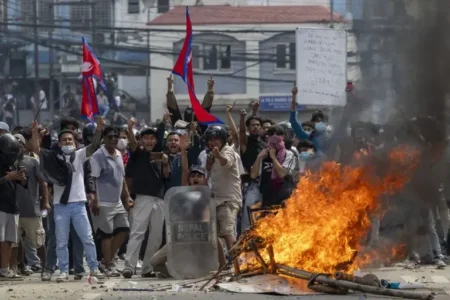The Supreme Court in Thailand has ruled that former prime minister Thaksin Shinawatra must serve a year in jail, in yet another blow to the influential political dynasty.
In a previous case, Thaksin was sentenced to years in prison for corruption but was transferred to a hospital.
The Supreme Court ruled on Tuesday that this transfer was illegal, and Thaksin, 76, must now serve his sentence in prison.
Thaksin and his family have dominated Thai politics since his election as PM in 2001, with his daughter Paetongtarn previously serving as leader.
Thaksin issued a statement on social media shortly after the judgment was published, declaring that “even if I lose my physical freedom, I will still have freedom of thought for the benefit of my country and its people.”
He also promised to keep his strength to serve the monarchy, Thailand, and its people.
The former prime minister was deposed in a military coup in 2006 and spent years living in self-imposed exile, primarily in Dubai.
When he returned to Thailand in 2023, he was swiftly tried and convicted of corruption and abuse of power while in office and sentenced to eight years in prison.
However, Thaksin only spent a few hours in a detention cell before complaining of heart problems and was transferred to a luxurious section of Thailand’s Police General Hospital.
-
Prosecutors seek arrest warrant for former South Korean first lady Kim Keon Hee
-
Yoon: South Korea’s ex-president indicted for abuse of power
Following his request for a royal pardon, the Thai king reduced his sentence to a year.
Thaksin was hospitalized for six months before being released on parole and returning to Bangkok.
On Tuesday, a Supreme Court judge noted in a statement that Thaksin “knew or could perceive that he was not in a critical or emergency condition.”
While Thaksin had underlying chronic medical concerns, he could have been treated as an outpatient, according to the judge, who ruled that his hospitalization was unconstitutional.
The “14th floor case,” as it is known in Thailand due to the hospital floor where he remained, has sparked considerable attention.
Many Thais have criticized how the matter was handled, claiming that the wealthy and influential are frequently given preferential treatment.
Many people had been keeping a careful eye on Thaksin’s movements before Tuesday’s judgment.
Last week, he rushed out of Thailand in a private plane to Dubai, claiming to be seeking medical care. He announced on social media that he planned to fly back for the court session.
He appeared in court in Bangkok on Tuesday morning alongside Paetongtarn, smiling and embracing the media and a group of fans. Thaksin wore a suit with a yellow tie, the hue associated with Thailand’s monarchy.
Paetongtarn told reporters after the judgment that she was “worried” about her father but that he and their family were in “good spirits.”
She also stated that she will continue to lead the family’s Pheu Thai party as an opposition party.
Thaksin’s case comes at a time when Thailand is experiencing political turbulence, and Tuesday’s court ruling is yet another indication of the Shinawatra clan and Pheu Thai’s changing fortunes.
Thaksin has had to deal with more than just the “14th floor case” in recent months.
He was also accused of insulting Thailand’s king, but a court cleared him of lese-majeste last month.
Meanwhile, Paetongtarn was engaged in controversy after Cambodian leader Hun Sen revealed a phone discussion he had with her about the Thai-Cambodia border issue, during which she addressed him as “uncle.”
She was then dismissed from office after the constitutional court determined she had violated the ethical norms expected of her position.
Thailand’s parliament elected Anutin Charnvirakul as the country’s third prime minister in two years.
Anutin’s Bhumjaithai party broke away from the Pheu Thai-led coalition and gained enough parliamentary support from another party to win the premiership.










